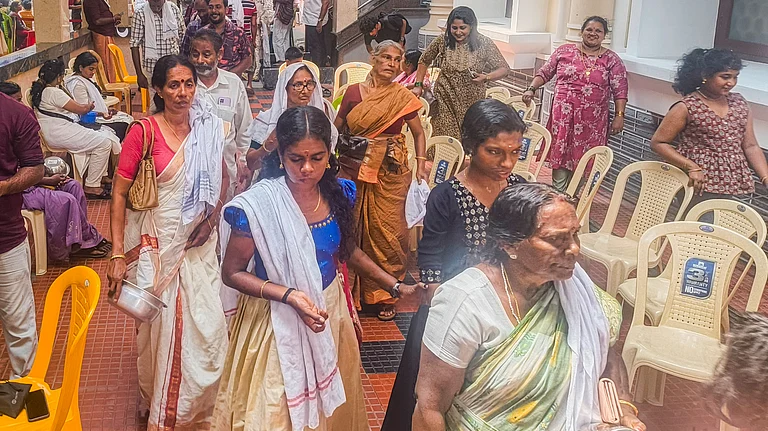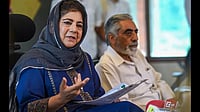Despite it being a sensitive issue in the region, the Karnataka-Maharashtra border dispute has not become a political issue this time. However, people in the region cry for development.
There are 264 Marathi-speaking villages that are in the affected region. The Mahajan Commission in its 1967 report recommendeded that these villages should be transferred to neighbouring Maharashtra. These villages come under Khanapur and Nippani assembly constituencies of Karnataka.
Caught in the border dispute on linguistic grounds for the last seven decades, the Khanapur assembly constituency located in Belagavi district of northern Karnataka is crying for development and people are pinning hopes on Prime Minister Narendra Modi for early resolution.
Karnataka goest to polls on May 10. The counting of votes will take place on May 13.
Border disputes and politics
The dispute over the transfer of the number of linguistic majority villages to both Karnataka and Maharashtra has gradually become a politically sensitive issue with neighbouring Maharashtra asserting its claim over more area.
The Maharashtra Ekikaran Samithi (MES), a pro-Marathi socio-political organisation which operates from Belagavi and enjoys support from across party linesafrom Maharashtra, has been fighting for this cause and even been contesting Assembly polls in Karnataka.
"MES has always fought the assembly election in Khanapur raising the linguistic issue, not development. Three generations have suffered without seeing any development," Vittal Mahadev Karambalkar, Vice-President of Mahalaxmi Group that owns a sugar factory in this region, told PTI.
Since the start of the assembly polls in 1960s in Karnataka, MES has won the maximum number of times from the Khanapur Assembly seat but no candidate has been re-elected so far. The BJP first won the seat in 2008, while the Congress did so in 2018.
"It was during the BJP tenure, about Rs 450 crore funds had come for the development of Khanapur. We hope the BJP wins again and our current generation gets to see development," said Parushuram Nayak, General Secretary, BJP-Schedule Tribe Morcha in Khanapur.
Lack of development in disputed region
The pendency of Maharashtra government's plea in the Supreme Court challenging the State Reorganisation Act of 1956 and non-implementation of the 1967 Mahajan Commission recommendations have led to the neglect of Khanapur, which lacks infrastructure like bus facilities and schools in forest areas, proper roads, bridges and canals, higher education centres, among others.
Baju Patil, a farmer who owns two acres of land in Junjanwad village here said: "I am not able to take two crops due to lack of irrigation. We could easily address the water problem if a canal is built as we have the Malaprabha river flowing in this area."
Patil said he even struggles to get good quality farm inputs and finds it difficult to sell the produce at minimum support price.
Many of them complained that they were getting only 15 days work under the Mahatma Gandhi National Rural Employment Guarantee Act (MGNREGA) in a year and it's hard to find a job in the absence of industry or business activity.
Although some of the eligible beneficiaries are getting the benefits of state and central schemes like free power for irrigation, financial assistance under the Pradhan Mantri Awaas Yojana (gramin) and PM-KISAN, the region still lags behind in development when compared to the neighbouring constituencies.
People and governments await resolution
Not only Khanapur, residents of many of the villages which the Mahajan Commission recommended for transfer to both states are waiting for early resolution of this dispute so that development works are not delayed further.
The Mahajan Commission in its report submitted in 1967 had recommended that 264 villages should be transferred to Maharashtra, and that Belagavi and 247 villages should remain with Karnataka. However, Maharashtra rejected the report, calling it biased and illogical, while Karnataka welcomed it.
Despite demands from Karnataka, the Centre never implemented the recommendations of the report. And irrespective of the party in power, both states have from the beginning struck to their positions.
The Mahajan Commission report was tabled in Parliament way back in 1970 but no discussion has taken place yet. However, in 2004, the Maharashtra government filed a petition in the Supreme Court challenging some provisions of the State Reorganisation Act, 1956 and demanded 865 villages from five districts of Karnataka.
"It's been 19 years, the apex court has not yet heard arguments about the maintainability of the petition. The Maharashtra government says it can get justice from the court, we are arguing the border issue comes under the purview of Parliament as per Article 3 of the Constitution," Kannada activist Ashok Chandargi said.
In the absence of "political will", the dispute remains unresolved despite the BJP-ruled governments in both states and even at the Centre. The stalemate continues till date and people continue to suffer, he added.
Unfortunately, the border dispute has not become an election issue in the Khanapur assembly segment where both BJP and Congress have fielded strong Marathi candidates Vittal Rao Halgekar and Anjali Nimbalkar respectively. MES has also fielded influential leader Muralidhar Patil to keep alive the border dispute issue.
Incidentally, many Marathi-speaking people are of the view that whatever little development undertaken so far in Khanapur is better than Maharashtra and have realised that MES has been fighting polls on linguistic grounds for political interests.
Asked if residents of Khanapur would be happy to be part of Maharashtra if the dispute gets resolved in the near future, householder Laxmi Bajirao Nayak said, "We have better facilities here and don't want to shift. I received Rs 1.50 lakh financial assistance under Awaas yojana and my father-in-law has received Rs 4,000 so far under the PM-KISAN."
"When I am getting everything in my house, why should I shift to another's house," Karambalkar said.
There are still some sections of people in Khanapur who want to be part of Maharashtra as they are finding it difficult to transact in Kannada language. For instance, property papers are in Kannada language which many people cannot read here.
A similar plight prevails in Kannada-speaking majority villages located in Maharashtra where the innocent people are caught in the crossfire of the current battle over the long-pending border dispute.
(With PTI inputs)






















